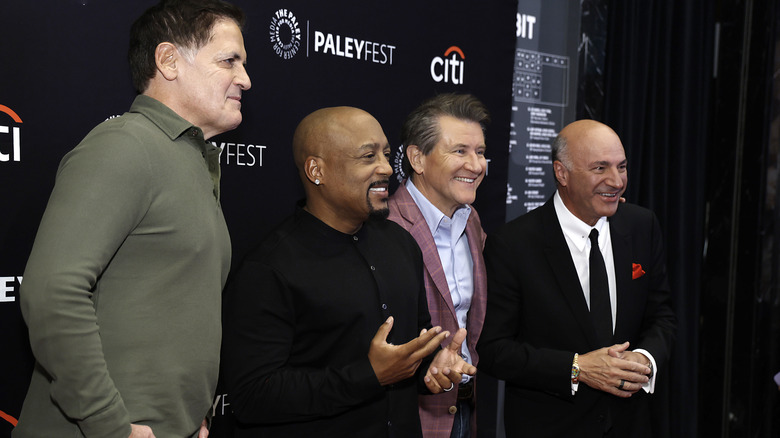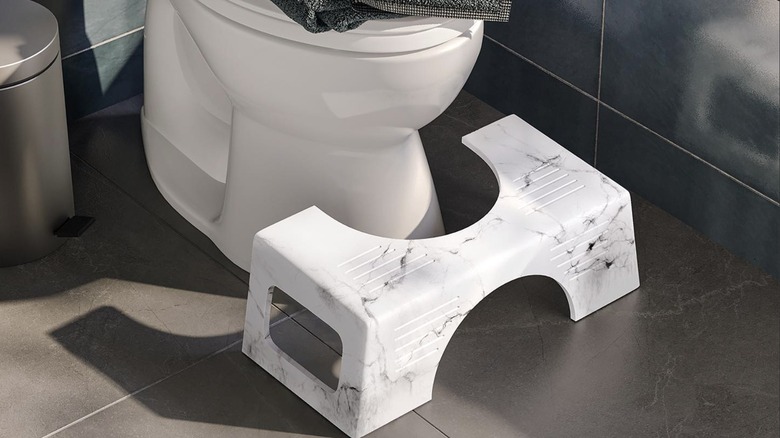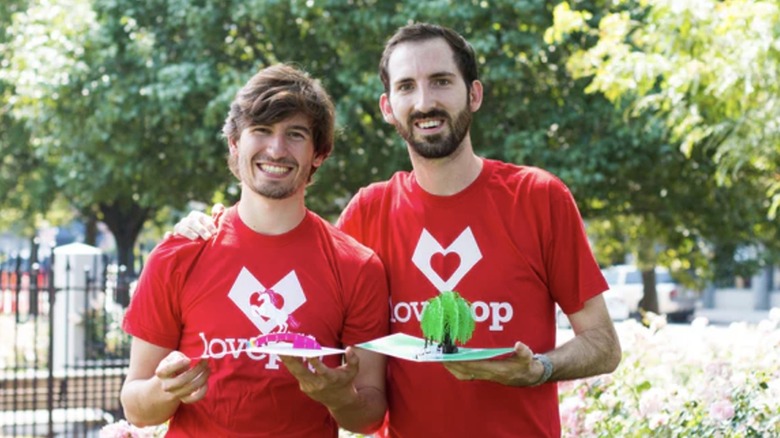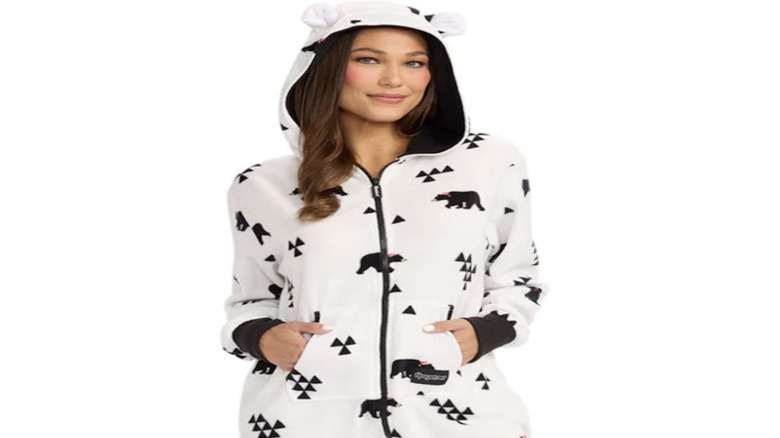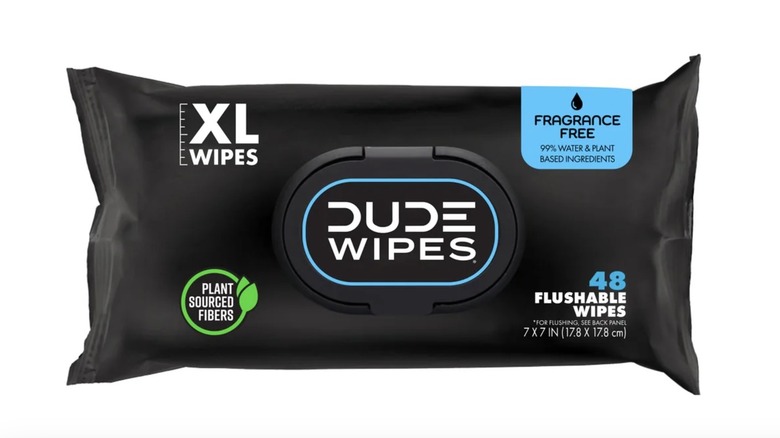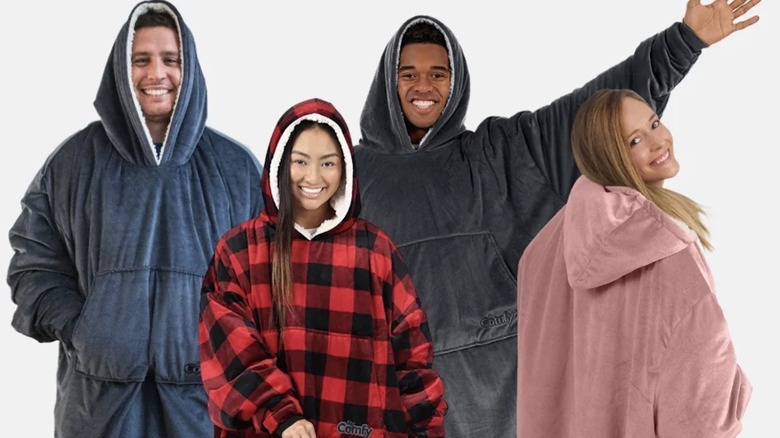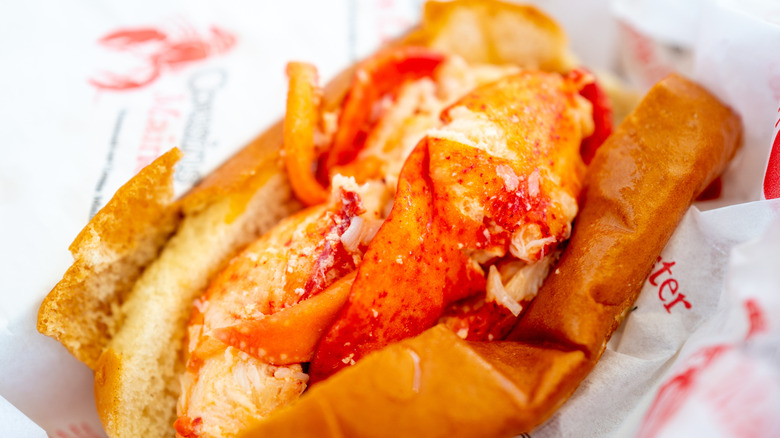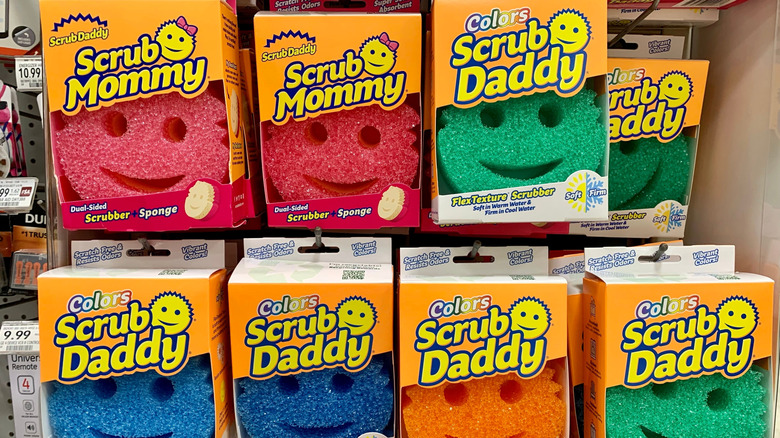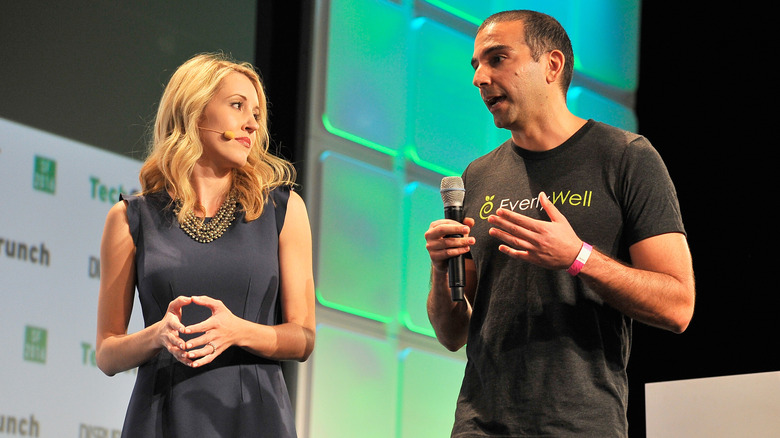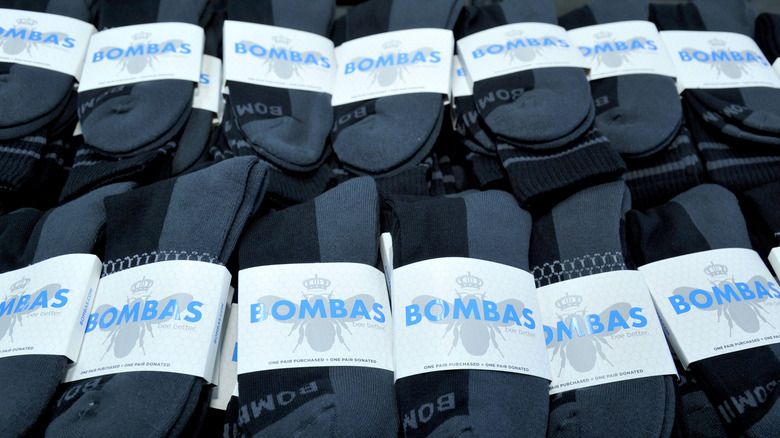The Most Profitable Shark Tank Products Of All Time
Initially airing in 2009, "Shark Tank" has gone on to become one of the most successful television shows ever, with hosts even more successful than the show itself. The idea of the show was a spin on a Japanese TV show with a similar concept — "The Tigers of Money" — and has various iterations under different names around the world like Canada's "Dragon's Den" among others. It's fair to say that over the last 16 seasons, hundreds of products have been pitched to the hosts who boast wealth in the hundreds of millions — even billions — of dollars. After assessing the value of the companies based on their product or service, the traits of the entrepreneurs themselves, and their guts, the Sharks may offer an investment in the hopeful entrepreneurs' companies. Just like any other business, however, some of these investments have done better for the sharks than others.
Money Digest researched some of the most successful of these endeavors and the sales generated since being invested in by the show hosts. According to sales numbers sourced by Sony Pictures Television (2023) via USA Today, the 12 most profitable "Shark Tank" products of all time have individually generated over $100 million in sales, with a few reaching the billion-dollar mark. That said, the sharks haven't always got it right, as evidenced by the tech company "Shark Tank" passed on that became an Amazon success story. However, when they've gotten it right, the returns have been massive.
CordaRoy's Convertible Bean Bags (Season 4): $195 million
According to Persistence Market Research, there's a huge billion dollar market for bean bags that may shock you. The global revenue for bean bags in 2024 will reach $5.8 billion and is likely to almost double by 2033 to $10.2 billion. In the U.S., the market for bean bags is anticipated to grow at a compound annual growth rate of 3.2% per year. With Millennials driving the market through online sales, more bean bag chairs and furnishing companies are racing to grow their online presence. With sales hitting $195 million as of 2023, it's unsurprising that Persistence Market Research includes this next successfully pitched "Shark Tank" winner in its list of top companies profiled.
CordaRoy's Convertible Bean Bags was born out of founder Bryon Young's desire to find a comfortable sleeping alternative for guests staying overnight after watching a football game. After successfully creating a bed out of bean bags for his guests, who raved about the comfortable sleep they had the next morning, he patented his bean bag that turns into a bed idea. In March 2013, Young made his pitch to the Sharks. While Young was hoping for a $200,000 investment for a 20% equity stake, he instead received a $200,000 offer from Lori Greiner for a 58% equity stake after spirited negotiation. The day the episode aired, the CordaRoy site crashed from the sales activity, marking the beginning of a lucrative business venture for Young and his new investor.
Squatty Potty toilet seats (Season 6): $260 million
As per Global Market Insights, the worldwide market for potty training tools and equipment in 2023 was $231.4 million, of which the U.S. alone accounted for $66.6 million thanks to the uptick in e-commerce and the size of the U.S. baby population. With that in mind, this next "Shark Tank" success story is even more impressive since this potty-related product accumulated sales totaling $260 million since its debut on the show in 2014. It's also not a potty, nor is it created necessarily for babies.
Back in 2010, Judy Edwards from St. George, Utah was having problems with constipation. The squatting position relaxes stomach muscles and straightens out the colon, making it easier to go number two with less effort. After Judy's doctor advised her that getting into a squat position could improve her prospects for pooping, her son Bobby built her a potty platform out of a stool so Judy could comfortably elevate her feet into a squat position while on the toilet. This industrious idea would land the Edwards family on "Shark Tank" and gain the interest of Lori Greiner. Since Grenier bought into the company with a $350,000 investment for a 10% stake, the company has been acquired by private equity firm Aterian Investment Partners and sold over 8 million toilet stools.
Lovepop 3-D greeting cards (Season 7): $304 million
According to market research provided by IBISWorld, the market for greeting cards in addition to other forms of publishing reached $5.8 billion in the U.S. in 2023, actually representing a decline in the market of 5.7% a year between 2018 and 2023. While this may seem like a market going in the wrong direction, there are still a few winners in the industry, and at least one of them is a "Shark Tank" alumni. Lovepop 3-D greeting cards are the love child of creators Wombi Rose and John Wise, both studying naval architecture and marine engineering when they encountered 3D pop-up greeting cards in Vietnam. Made using a Japanese art form called kirigami — a close cousin to origami that involves both cutting and folding paper — the pair used their engineering and architecture skills to learn the art. After branding their greeting card company Lovepop and showcasing the company at trade shows in 2014, the duo decided to bring their product to the sharks.
This time, Kevin O'Leary was the investor to jump at the opportunity, perhaps swayed by the special dollar sign card made specifically for him and the potential value of wedding packages he envisioned selling through his Something Wonderful platform — an online platform for O'Leary businesses that share the same consumer demographics to strategically piggy back off each other. The founders hoped for a $300,000 investment and a 10% stake. They left with $300,000 and O'Leary's 15% stake.
Tipsy Elves Christmas sweaters (Season 5): $317 million
As the holiday season inches closer, you may be thinking about how to budget to avoid debt after holiday shopping. May we suggest a Tipsy Elves ugly Christmas sweater? Currently, everything is at least 30% off on the brand's online store, guaranteeing more sales to top off the $317 million already on the books. According to the Financial Post, the founders, Evan Mendelsohn and Nicklaus Morton, were inspired by invites to ugly sweater parties where they couldn't find anything original or comfortable to wear. The pair launched the company with $140,000 of their own money, and by the time they made it to "Shark Tank" in 2013, the company had already done its first $900,000 in sales.
The pair asked for $100,000 for a 10% stake in their line of ugly Christmas sweaters. After starting a bidding war between Kevin O'Leary — who offered the owners $100,000 for a $2 royalty they would be expected to recoup, plus a dollar in perpetuity — and Robert Herjavec, who offered $100,000 for a 10% stake in the business. In the end, Herjavec won out over O'Leary. Herjavec was impressed by the fact that Mendelsohn had quit his law career to go all in on Tipsy Elves, and has made no secret of his belief that Tipsy Elves has been his favorite investment. The company's products have since expanded to include pajamas, snow suits, jumpers and other apparel.
Dude Wipes male hygiene wipes (Season 7): $341 million
The market for baby wipes in the U.S. captured $2.7 billion in 2023, more than half of the total $4 billion market across North America. As they are marketed mainly to parents for their babies, it's an impressive feat for a company to walk onto the set of "Shark Tank" and successfully pitch baby wipes for grown men, but that's exactly what co-founder and CEO of Dude Wipes Sean Riley did. Riley's idea came to him in college, on a week when he was responsible for purchasing household necessities for his roommates. After buying paper towels, toilet paper, and baby wipes for the bathroom, Riley noticed that the baby wipes were disappearing. The wipes were a big hit for the testosterone-fueled apartment, and Riley believed the only reason more men weren't using them was because wipes weren't being marketed toward them.
In 2011, Riley and friends from college developed their first product — flushable single travel wipes — and over the next four years sold their product on their own. Their 2015 appearance on "Shark Tank" won them Shark Mark Cuban's favor, and $300,000 worth of Cuban's money in exchange for a 25% stake in the company. A year later, Dude Wipes earned $3.2 million and was being stocked on shelves in Walmart and Target. Dude Wipes' sales climbed to $341 million dollars in 2023, making this company anything but a bum deal.
The Comfy blanket sweaters (Season 9): $550 million
Blankets were a $3.34 billion business in the U.S.in 2023, and expected to grow to $3.44 billion by the end of 2024. A wearable blanket is a unique spin on a classic product, and is also a "Shark Tank" winning idea for brothers Brian and Michael Speciale. The brothers launched their brand of wearable hoodie blankets in May 2017 and auditioned for the show in Denver, Colorado a month later. By September of the same year, they were standing in front of the Sharks. They didn't have a product to sell yet, but they charmed the Sharks with their prototype and personality. Their idea — inspired by seeing one of their kids wearing an adult sweater that covered their whole body — earned them a $50,000 investment for a 30% stake from Shark Barbara Corcoran.
By 2020, the company was earning $65 million in revenue. However, the war in the Ukraine, combined with the pandemic, quickly taught the brothers the importance of the global supply chain. Hampered by cash and credit issues, a CEO who overspent on advertising, and a Shark investor unwilling to step in, the company almost folded. But the company is still alive and kicking, with $550 million in sales in 2023. While this wasn't an easy slam dunk for the founders, it's unlikely the company could have made it to this point without Corcoran, who has key advice for Gen Zers entering the workforce.
Cousins Maine Lobster (Season 4): $585 million
Cousins from the state of Maine, Jim Tselikis and Sabin Lomac, are the founders of Cousins Maine Lobster. As told to CNBC, the cousins were operating a single food truck in Los Angeles, California. Purchased with a combined $20,000 investment, the duo's pledge to serve up fresh lobster rolls stuffed with Maine lobster was a hit, catching the attention of media and "Shark Tank" producers. After taking a drubbing from Mark Cuban for not immediately having all the answers to his questions, they were saved by Barbara Corcoran, who stepped up with a $55,000 investment for a 15% stake in the company. According to Jim Tselikis as per CNBC, Corcoran's influence brought the company national media attention on morning shows and Food Network series, and her initial stake in the company allowed them to purchase a second food truck.
The company has since grown into a major franchise, with food trucks and brick and mortar versions of the business now located in 27 states across the country. As of May 2023, the company had made $585 million in sales, an amount more than 10,000 times Barbara Corcoran's initial $55,000 Shark investment.
The Bouqs Co. flower delivery (Season 5): $640 million
The global flower delivery market was $6.89 billion in 2023 and is expected to almost double over the next decade. One of the companies used in the research to establish these numbers is The Bouqs Company, an alumnus of "Shark Tank" that was actually passed over by the Sharks. Initially. Everything from feeling the company was overvalued, the ask was too high, to even not liking the company name had the Sharks turning up their noses at founder John Tabis. Turning an e-commerce company with a "family and friends" investment of $13,000 into $700,000 in sales in a year couldn't sway them. An eco-friendly product grown by farms near the equator in volcanic soil? Nada. Raising $1.1 million in a seed round didn't help either, as it just seemed to offend Shark Mark Cuban that he wouldn't have exclusivity as an investor.
Rejected, Tabis went back to building his business, which included raising another $1.7 million in another seed round. However, three years after the debacle on "Shark Tank", Shark Robert Herjavec reached out to The Bouqs Company for assistance with his wedding. After saving almost 70% on floral arrangements with the company, Herjavec finally saw its potential and participated in a seed round that generated $24 million in funding. By 2023, The Bouqs Company had made $640 million in sales, and is now the one "Shark Tank" deal Mark Cuban regrets passing on.
Scrub Daddy reusable sponges (Season 4): $926 million
For the founder of Scrub Daddy, Aaron Krause — who engineered and patented a polymer foam that hardened under cold water and softened under warm water for a better cleaning experience — a visit to the Tank would change his life and further enrich his Shark investor in ways likely unexpected for both. The odor-resistant, smiley face sponge debuted in the fourth season and was a hit with Lori Greiner, who offered Krause $200,000 for a 20% stake in Scrub Daddy. This was $100,000 more and 10% higher a stake in the company than Krause had initially asked for, intending to use the money to launch his own manufacturing facility for the product. The offer came after a bidding war between Sharks Greiner, Daymond John, Kevin O'Leary, and the latter of whom offered a lowball $100,000 for 50% of the company.
Scrub Daddy secured partnerships with multinational consumer goods corporation Unilever, and major power tool company, Dremel, in 2023. Unilever partnered with the company on a line of cross-branded cleaning products, while Dremel made use of the company's patented sponge technology in its Dremel Cordless Versa Scrub Daddy Power Scrubber Tool Kit. Scrub Daddy is now a top player in the Global sponge market, part of a $5.4 billion dollar global market in 2023 projected to rise to just over $6.5 billion by 2031. By 2023, Scrub Daddy had amassed $926 million in sales.
Everlywell at-home medical testing kits (Season 9): $1.1 billion
According to Transparency Market Research, the global market for at-home medical testing kits is projected to be worth $12.3 billion by 2034. "Shark Tank" pitch winner Everlywell is considered a key name dominating the industry in North America, the number one market for at-home testing kits in the world. Founder Julia Cheek must have known the value of this market in advance of making her pitch to the Sharks on the show, considering she walked in with a very confident million-dollar ask in exchange for a 5% stake in Everlywell. Cheek was inspired to create the company based on her personal experience of spending exorbitant time and money on lab testing to figure out a hormonal imbalance. The company offers independent lab testing for several specific health issues related to gender, nutrition, reproductive, heart, and general health, as well as vitamin supplements. Board certified doctors review and return the results to customers within days, ending long wait times and unclear testing results.
Unlike every other Shark on the show, who were leery of the amount of competition and capital it would take to make the company viable, Lori Greiner saw the value proposition of the product immediately. The Shark offered Cheek a $1 million line of credit at 8% interest for a 5% stake of the company. As of 2023, Everlywell had hit $1.1 billion in sales.
Bombas athletic socks (Season 6): $1.3 billion
The founders of Bombas, David Heath and Randy Goldberg, had figured out how to make athletic socks more comfortable, aesthetically pleasing, and charitable — the company donates a pair of socks to homeless shelters for every pair they sell. The addition of factors like temperature controlled materials or heel and arch support, are just a few of the highlights of Bombas. Their visit to "Shark Tank" included an ask of $200,000 for a 5% stake in the company.
They had their work cut out for them once they revealed their presumed valuation of $4 million, which Kevin O'Leary zeroed in on and which had him refusing to invest. For Robert Herjavec, the future of the company was too difficult to project since the majority of the company's sales at the time came from word of mouth. Lori Grenier was turned off by the pair's desire to use the money for hiring marketing companies instead of taking the initiative themselves. Mark Cuban believed the profit margins were too small. Finally, Daymond John saved the founders' pitch after they cut their valuation in half and accepted a $200,000 deal for a 17.5% stake, and financing for inventory and product. Although the one "Shark Tank" deal John regrets turning down was incredibly lucrative, he made up the difference with this investment. Bombas had sales worth $1.3 billion as of 2023, making it the show's most profitable product to date.
